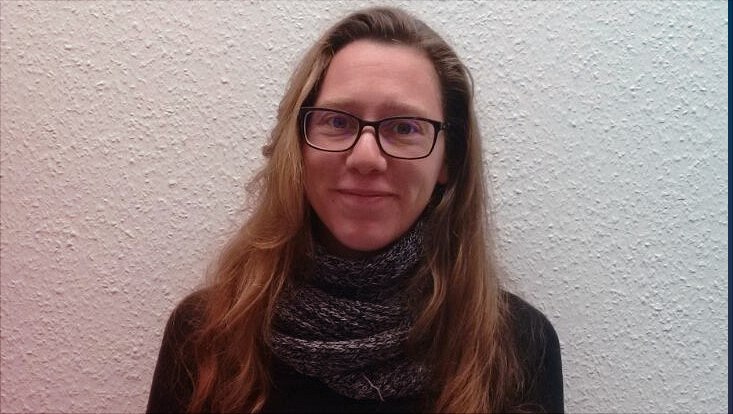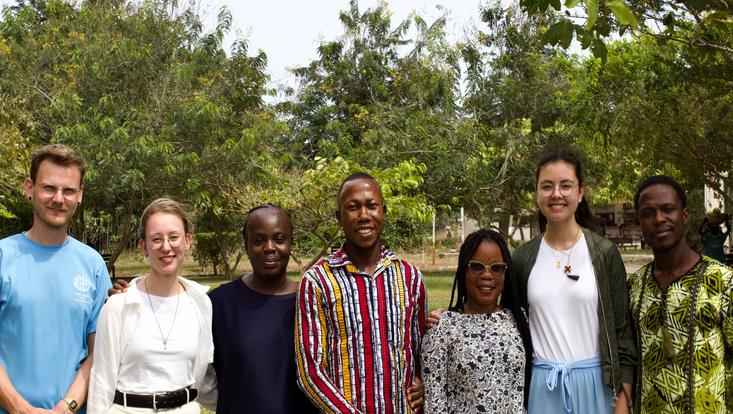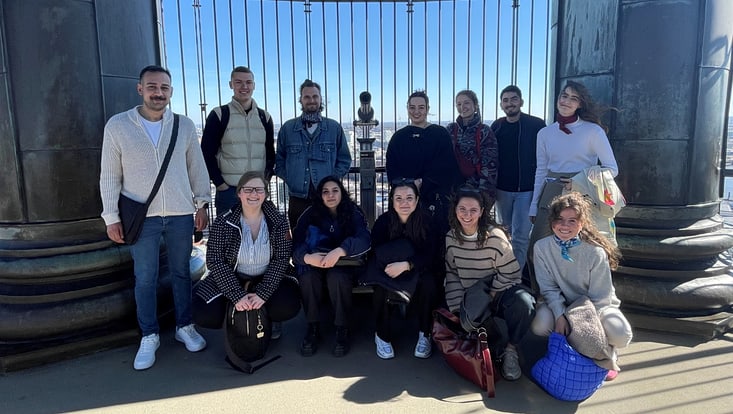"My experience has been beyond my expectations"An interview with visiting scholar Magali N. Alloatti
11. Februar 2021

Foto: Alloatti
Dr. Magali Alloatti war für 15 Monate Gastwissenschaftlerin an der Fakultät für Erziehungswissenschaft im Team von Prof. Dr. Sara Fürstenau. Im untenstehenden Interview berichtet sie von ihren ursprünglichen Erwartungen an den Aufenthalt in Hamburg, welche Auswirkungen die Pandemie auf die Forschung und das Leben hatte und wie sie die hiesige Work-Life-Balance erlebt hat.
Dr. Magali Alloatti was a Visiting Scholar from October 2019 until December 2020 at the Faculty of Education hosted by Prof. Dr. Sara Fürstenau. Her stay in Hamburg took place in context of the research project Transnational Families: Gender and Education and her stay was funded through a CAPES scholarship.
Faculty of Education: Magali, you have research experience in Brazil, Argentina, and the USA. With what expectations did you come to Germany and Universität Hamburg?
Dr. Magali Alloatti: Germany has embraced the idea of being a country of immigration quite recently, which has prompted changes in legislation, but also in public perception. Migration and refugee are key aspect to German legislation and current social debates. Thus, I believe it cannot be a better time to explore these phenomena.
On a personal note, I could not wait to work at UHH. Universität Hamburg is a prestigious institution and in the forefront of research. I was extremely excited to get familiar with topics and literature discussed here, learn new ways to collaborate, and different approaches. On this regard, I must say that my experience has been beyond my expectations.
A few months into your stay in Hamburg we were all struck by the beginning of the Corona pandemic which is still ongoing. How did you experience this situation and how did it affect your research?
Well, I must say that when we started our project, I proposed the idea of collecting data with an app-base questionnaire which was developed with the support of the research team. When social distancing measures were initially installed, this early choice showed itself quite helpful. Therefore, I modified the questionnaire to be self-administrated controlling data collection and defining a single on-line submission. Therefore, our research schedule was not affected by social distancing measures.
Personally, I would say that conducting research without having personal ‘face-to-face’ contact with people can be quite challenging. Even when we work with statistics, it is imperative to remember that our work is about and with human beings. But, at the same time it was necessary to understand that keeping our distance was important to contribute to everybody’s well-being. I am most grateful to Prof. Dr. Fürstenau and the research team since they were extremely active in creating digital spaces for us to work together and support each other. Being so far away from home is always difficult, the pandemic intensified this. But my colleagues made me feel among friends and our work was re-organized in a way that considered our personal feelings and working capabilities during such unprecedented times.
What effect does the current pandemic have on transnational families and transnational educational careers? Do you have any results from your data on this?
While we are still analyzing our data, I would say that traveling restrictions have presented an unparalleled challenge to families that have members abroad. When it comes to entire families in different countries, time is experienced in different ways. When there are toddlers or young children, the ‘passing of time’ is conveyed by their growing; thus, special dates, such as Christmas, are significant moments eagerly awaited by grandparents and extended family. In many cases visiting the home country is a moment of updating and strengthening family ties, and in some cases to check on investments or taking care of bureaucracies.
Nevertheless, transnational families are characterized by social dynamics (i.e. communication and connections) that challenge national boundaries. What could seem as mere weekly video calls with grandparents or sons and daughters who reside in Brazil, are sometimes spaces in which family decisions (such as how to raise children, education, family conflicts, investments, etc.) are being made, negotiated, and challenged. I cannot yet say about our data but based on my research experience I would say that families who have already incorporated transnational dynamics are navigating these difficult times in a smoother way than other families or groups that for the first time must rely solely on digital forms of communication.
Looking back on 15 months of living and working in Hamburg – what is the most striking thing you will remember?
Even though I have lectured and visited Europe before, this is the first time I have lived here. I must say what has struck me the most is the life-work balance that people promote and defend here, even in an exigent space such as academia. Even though our working schedule was quite demanding, I came to appreciate the importance of free time and respecting my working capabilities. While in other places ‘the more you work the better the result’, here my colleagues and supervisor taught me the value of working in a sustainable fashion. This is essential since we work as a team, so it is utterly important to promote a healthy working environment for you and others.
In terms of daily life, Hamburg has provided me with a very pleasant and healthy urban environment to live in, which I have not experienced before. The city has many parks, green spaces, beautiful streets that I visited riding my bicycle. The city also changes considerably with the seasons, so during the spring and summer it felt that I was in a completely different place. I have learned not to underestimate the value of a bicycle-friendly city and the liberty of walking to any place in it. This not only offered me a healthy lifestyle, it also promotes respect for public spaces through the freedom of movement and enjoyment.
Wir danken Frau Dr. Alloatti für dieses Interview. Im Beitrag zum Forschungsprojekt des Monats Juni wird die Arbeit des Forschungsprojekts, in dem Frau Alloatti tätig war, ausführlicher erläutert.


